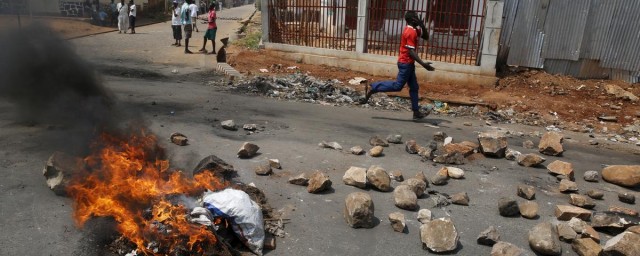Genocide and Violence
Genocide refers to the deliberate and systematic killing of an ethnic, racial, or religious group. In recent years Africa has had a tragic history of genocide and violence. Millions of lives have been lost in civil wars and other conflicts, while tens of millions of Africans have had to flee their homelands and live as refugees. The increase of violent conflicts during the late 1990s devastated many African nations and severely damaged their economies. In some cases this has led to the partial and even total collapse of states.
Africa has witnessed violence throughout its history. Recent upheavals, however, reveal some new characteristics. In the decades since independence, African nations have faced the challenge of trying to unite diverse groups whose identities are based on race, ethnicity, language, culture, and religion. They have also grappled with the problem of determining how these groups should share power, national wealth, and economic opportunities. In many cases, nations have failed to meet these challenges, and the result has been staggering levels of genocide and violence among competing groups.

Traditional African Society
Although conflict is a fact of life, people generally prefer to cooperate rather than fight. The extent to which the members of any community live together in peace depends in large part on the strength of their culture and the effectiveness of their codes of behavior. Stable groups accustomed to working together tend to avoid physical conflict, while instability and disunity contribute to outbreaks of violence.
Studies of African cultures have noted that people in traditional societies generally lived together peacefully. Their cooperation grew out of a common identity based on KINSHIP, language, ethnicity, race, and religion. Traditional behaviors, enforced by tribal leaders and elders, helped to bring about unity and social harmony.
Conflict in Modern Africa
Some of the conflicts troubling Africa today grew out of its history of colonialism and of national policies after independence. European powers created colonies that largely ignored the traditional divisions and boundaries of African societies. Each colony contained a variety of racial, ethnic, cultural, and religious groups that may or may not have lived and worked together in the past. Groups sharing a common identity were often broken apart, and colonial authorities encouraged different groups to remain separate.
During the struggle for independence, the various groups in a colony usually worked together to gain freedom from European control. After winning independence, however, conflicts arose among these same groups over who would control the power and wealth of the new country.
Some African leaders tried to create a new group identity based on national citizenship. In many cases, however, one group tried to impose its own culture on the rest of the nation. Doing so provided a basis for discrimination and often led to outbreaks of violence as minority groups fought oppression by others. Members of the dominant group, in turn, sometimes took action to protect their own power and privilege.
Most African countries are now more or less united on the issue of national borders but are still struggling to bring together diverse groups of citizens. Power, participation in government, wealth, and opportunity are not shared equally among the competing groups. The greater the gulf between the groups, the more likely the breakdown of order and eruption of violence. In some instances the conflicts have escalated and turned into genocidal wars.
Since the 1960s, civil wars in ANGOLA, SUDAN, and MOZAMBIQUE have resulted in the deaths of hundreds of thousands of people. Similar wars and violence have led to the collapse of SOMALIA and LIBERIA, and conflicts threaten to overwhelm other African nations as well. Perhaps the worst case of genocide on the continent occurred in RWANDA in the mid-1990s. Conflict between the Hutu and Tutsi in Rwanda erupted in a wave of genocide that claimed the lives of more than 500,000 people and forced millions more into exile as refugees in neighboring countries. Rwanda's neighbor, BURUNDI, has been devastated by genocidal wars between Hutu and Tutsi groups as well.
Finding Solutions
Some African nations have tried hard to resolve ethnic, religious, and racial divisions and reduce the levels of conflict in their societies. However, huge differences in the wealth, opportunity, and role in government of various groups exist in many countries. Other nations and international agencies have tried to help find solutions to these problems, and they have provided much needed aid in times of crisis. The basis for lasting peace and stability, however, must be found by Africans themselves. While honoring traditional distinctions, all groups must learn to respect and tolerate others and to share power and resources fairly. (See also Class Structure and Caste; Colonialism in Africa; Development, Economic and Social; Ethnic Groups and Identity; Human Rights.)